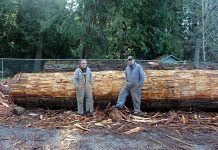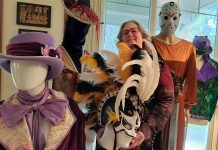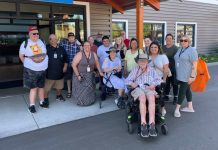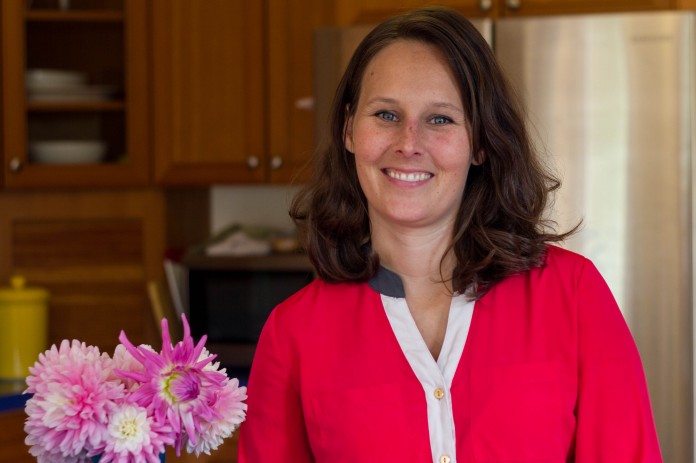
By Laura Rogers
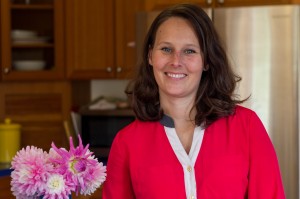
School is back in full swing. This time of year, I can’t help thinking of all the busy teachers out there pouring every ounce of their time, energy, and love into teaching our children.
The very beginning of school, especially, is an important time for children. Kindergarten has changed a lot from what it used to be. There is so much research available now on what young children need developmentally and individually, and the teachers are integrating these findings into their classrooms. Kindergarten is no longer a half day at school with naps and a one-size-fits-all curriculum.
I met up with Bellingham Public Schools wonderful kindergarten teacher, Helena Quigley, to get the scoop on what kindergarten in 2015 is all about.
Helena Quigley has been teaching at Cordata Elementary since it opened five years ago. Recently completing her Masters in Early Childhood Education, she has even more tools and insight into what kindergarteners need to learn best. Helena is a busy woman. Along with going to school and teaching, she had a baby earlier this year. Helena lives in Bellingham with her husband and four sons. She currently teaches kindergarten, but has also taught 1st, 2nd, and 4th, and has previously taught at Birchwood and Geneva.
“Kindergarten is the hardest of all the grades I’ve taught,” explains Helena. “The kids make so much dramatic growth. Between September and winter break, they become totally different kids. It’s really fun to see.”
The transfer Helena made from Geneva to Cordata turned out to be a serendipitous move. Her dad, Kent Quigley, who has taught in the district for 17 years, also made a decision to transfer to Cordata, and neither had consulted with the other. Every week, the two teachers coordinate ‘Buddy Time,’ where Kent’s older students work with Helena’s kindergarteners.
“This is time for my 3rd and 4th graders to take on the role of teacher, and when you teach, you learn things at a very high level,” shares Kent. “For the kindergartens, they get a buddy, an older student that they can build a relationship with. During this buddy time, the buddies collaborate and work together on science, art, literacy and math. The opportunity to team-teach with my daughter has been a highlight of my teaching career. She’s a naturally gifted teacher and I’ve learned a lot from watching her.”

Through my conversation with Helena, I learn that the first days and weeks of kindergarten are all about building stamina and establishing routines. “It’s important not to overwhelm the kids. In my class, I honor 60-90 minutes of play everyday.” She explains how they make a plan together about what they will play with. Incorporating play and planning into academics is just as important as the academics themselves. “Good activities are sensory based and they are active,” shares Helena. Students begin learning to read, not with formal literacy tasks, but with fun, simple patterns that set the kids up with tools they will need for the rest of the year.
Aside from routines, play, and stamina-building, an essential part of starting school is simply students feeling connected to their teachers. When talking to Helena about how hard it might be to get to know all twenty-or-so kids at the beginning of the year, she laughs and her eyes sparkle as she tells me, “People don’t always think about that part of teaching. Relationship building is a main focus at the beginning of the year. I have to create trust with each and every one of my kindergarteners. It’s my favorite part of teaching.”
Having my own five-year-old in kindergarten this year, what I find myself wishing for most, is for my child’s abilities and personality to be acknowledged on an individual level. It’s funny that this focus on individual attention is what keeps being repeated as we talk. “Our goals across the board are highly individualized to each student,” Helena emphasizes. “We really meet kids right where they are at.”
“We also spend a lot of time discussing, at the beginning of the year, what makes each child special and what sorts of things make them different than their friends,” she adds.
When we discuss the specifics of academics, Helena talks about the big picture of maintaining students’ natural confidence. “In kindergarten, we are setting the stage for them as learners. In some cases, we are putting pencils in their hands for the first time. We’re helping them see themselves as writers, scientists, etc,” explains Helena.
When she says this, I could see the weight of it for her. I fully admit to tearing up multiple times as she talked.
She also discusses the nuts and bolts of literacy, though confessing “there’s just so much to tell, it’s the tip of the iceberg I’m sharing.” The kids start with patterned text and heavy picture support in the beginning of the year, and that changes significantly as the year goes along. Helena teaches a balanced literacy approach, which means students learn both sight words and phonics, with a deep emphasis on comprehension. She also says she relies heavily on parents reading to their kids at home, which teaches important elements of how a story goes together.
Overall, I get the message that Helena’s teaching style is about helping kids at the many different levels they are at when they come to school. “Teacher’s jobs have gotten so much harder,” she admits. “We’re differentiating so much and that is more work, but that’s how kids learn.”
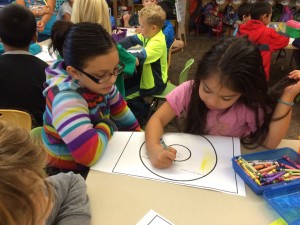
Next, we shift to talking about Cordata Elementary School specifically. It’s clear Helena has a deep love for this amazing school. Not only do they work to nurture each and every child in kindergarten and beyond, but Cordata goes above and beyond in so many ways. Helena shares with me that they have an incredible Early Childhood Development Coordinator who helps new teachers, passes along information about early childhood, and even comes in to help set-up classrooms.
As a key component of the Bellingham Promise, Cordata also has a Promise Kindergarten program, which they piloted in 2014. The program is a free, public Pre-K class that runs from February to June. Promise K aims to serve the children who’ve been falling into the gaps; whose families may not be able to afford preschool and/or who might be on a waiting list for Head Start.
Helena stresses the positive impact of Promise K on incoming kindergarteners. “The kids who attended Promise K know the routines, and they become the leaders as they head into kindergarten. Also, it’s been amazing to see how the staff at Cordata banded together to make the Promise Kindergarten program fit. We shifted classrooms and made it work. We didn’t have a staff room for a while,” she said with a laugh. “But we figured it out and it has been so worth it.”
It’s readily apparent that Cordata teachers love their school. Helena says, “I really have never worked at a school with such an intense drive to work together in order to help students reach their fullest potential. At Cordata, we feel that the whole child is important so along with academics we strive to support social and emotional development as well as helping them develop their interests and honoring their passions that they bring to the table. That’s pretty special.”
What Helena’s dad, Kent Quigley, appreciates most about working at Cordata is the diversity in the student population. “When our students are together, it is very representative of society as a whole. Our students are developing respect, tolerance and the ability to work together,” he concludes.



